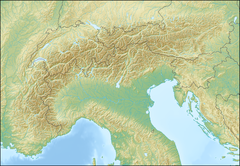
Back Mont Blanc-tonnel Afrikaans Манбланскі тунэль Byelorussian Монблански тунел Bulgarian Túnel del Mont Blanc Catalan Montblanský tunel Czech Mont Blanc-tunnelen Danish Mont-Blanc-Tunnel German Tunelo de la Blanka Monto Esperanto Túnel de Mont Blanc Spanish Mont Blanceko tunela Basque
Location in the western Alps | |
| Overview | |
|---|---|
| Other name(s) | Tunnel du Mont-Blanc (French) Traforo del Monte Bianco (Italian) |
| Location |
|
| Coordinates | 45°51′14″N 6°54′50″E / 45.854°N 6.914°E |
| Status | Open |
| Route | |
| Start | Chamonix, Haute-Savoie, France |
| End | Courmayeur, Aosta Valley, Italy |
| Operation | |
| Work begun | May 1959 (1946) |
| Constructed | 1959–65 |
| Opened | 19 July 1965 |
| Operator | MBT-EEIG, controlled by both ATMB and SITMB |
| Traffic | Automotive |
| Character | Passenger and freight |
| Toll | €48.- (one-way), 2020 passenger vehicle over €300 (one-way), three or more axles |
| Technical | |
| Length | 11.611 km (7.215 mi) |
| No. of lanes | 2 |
| Operating speed | 50–70 km/h (31–43 mph) |
| Highest elevation | 1,395 m (4,577 ft) center |
| Lowest elevation | 1,274 m (4,180 ft) France (NW) |
| Tunnel clearance | 4.35 m (14.3 ft) |
| Width | 8.6 m (28 ft) |



The Mont Blanc Tunnel (French: Tunnel du Mont-Blanc, Italian: Traforo del Monte Bianco) is a highway tunnel between France and Italy, under Mont Blanc in the Alps. It links Chamonix, Haute-Savoie, France with Courmayeur, Aosta Valley, Italy, via the French Route Nationale 205 and the Italian Traforo T1 (forming the European route E25), in particular the motorways serving Geneva (A40 of France) and Turin (A5 of Italy). The passageway is one of the major trans-Alpine transport routes, particularly for Italy, which relies on this tunnel for transporting as much as one-third of its freight to northern Europe. It reduces the route from France to Turin by 50 kilometres (30 miles) and to Milan by 100 km (60 mi). Northeast of Mont Blanc's summit, the tunnel is about 15 km (10 mi) southwest of the tripoint with Switzerland, near Mont Dolent.
The agreement between France and Italy on building a tunnel was signed in 1949. Two operating companies were founded, each responsible for one half of the tunnel: the French Autoroutes et tunnel du Mont-Blanc (ATMB), founded on 30 April 1958, and the Italian Società italiana per azioni per il Traforo del Monte Bianco (SITMB), founded on 1 September 1957.[1] Drilling began in 1959 and was completed in 1962; the tunnel was opened to traffic on 19 July 1965.
The tunnel is 11.611 km (7.215 mi) in length, 8.6 m (28 ft) in width, and 4.35 m (14.3 ft) in height. The passageway is not horizontal, but in a slightly inverted "V", which assists ventilation. The tunnel consists of a single gallery with a two-lane dual direction road. At the time of its construction, it was twice as long as any existing highway tunnel.[2]
The tunnel passes almost exactly under the summit of the Aiguille du Midi. At this spot, it lies 2,480 metres (8,140 ft) beneath the surface, making it the world's second deepest operational tunnel[3] after the Gotthard Base Tunnel.
The Mont Blanc Tunnel was originally managed by the two building companies. Following a fire in 1999 in which 39 people died, which showed how lack of coordination could hamper the safety of the tunnel, all the operations are managed by a single entity: MBT-EEIG, controlled by both ATMB and SITMB together, through a 50–50 shares distribution.[4]
An alternative route for road traffic between France to Italy is the Fréjus Road Tunnel. Road traffic grew steadily until 1994, even with the opening of the Fréjus tunnel. Since then, the combined traffic volume of the former has remained roughly constant.
- ^ Barry, Keith (15 July 2010). "July 16, 1965: Mont Blanc Tunnel Opens". Wired. Retrieved 16 July 2010.
- ^ Soule, Gardner (December 1959). "World's longest auto tunnel to pierce the Alps". Popular Science. pp. 121–123/236–238.
- ^ "Today in Science History". Retrieved 22 November 2014.
- ^ "A French-Italian Operator - Autoroutes et Tunnel du Mont Blanc". Archived from the original on 29 July 2012. Retrieved 27 September 2011.
